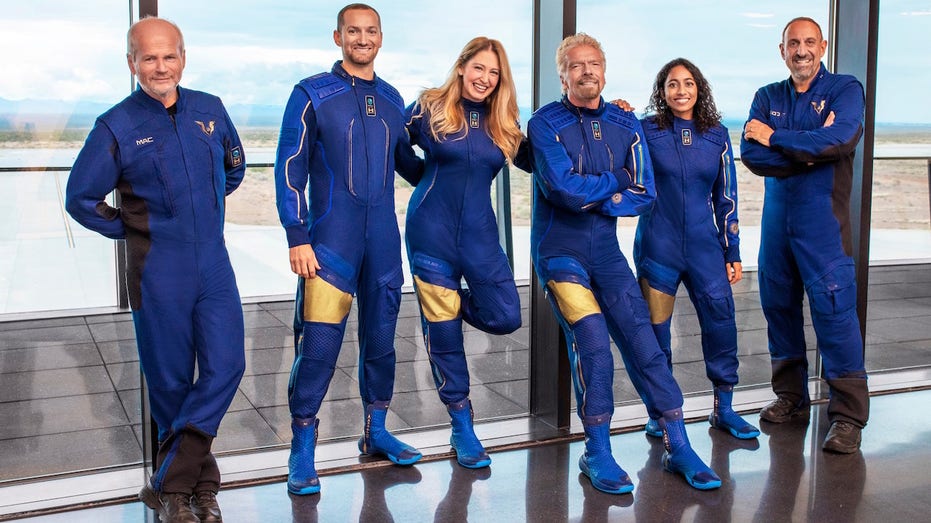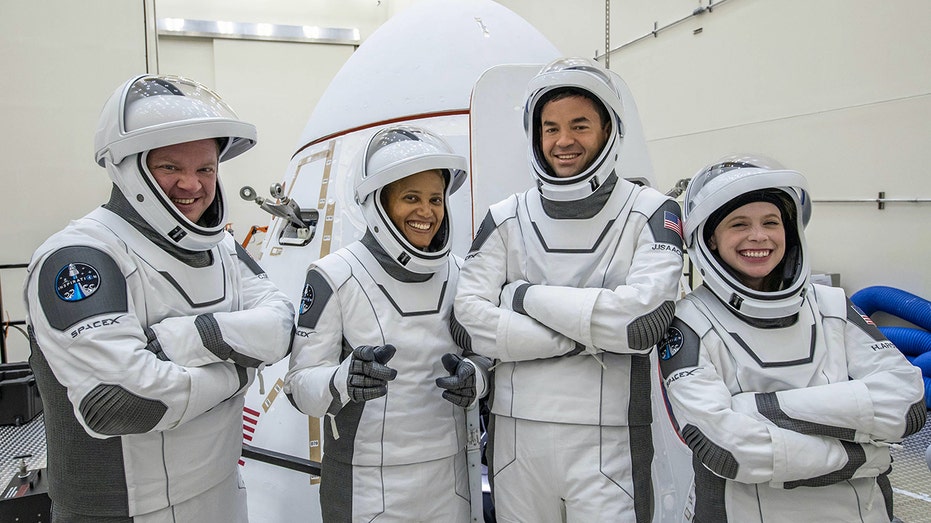FAA to retire astronaut wings program as commercial space tourism race ramps up
Instead of issuing the astronaut wings, the agency will recognize individuals who reach space on its website beginning in 2022
Russia claims NASA astronaut drilled hole into a spacecraft
Fox News’ Kat Timpf reacts to the astronaut allegedly damaging an aircraft after a breakup on ‘Kennedy.’
The Federal Aviation Administration will retire its Commercial Space Astronaut Wings program as the number of human spaceflights are expected to dramatically increase in the coming years.
BLUE ORIGIN FLIGHT: WHAT TO KNOW, HOW TO WATCH
The Commercial Space Astronaut Wings program, created in 2004 by Patti Grace Smith, former associate administrator of the FAA's office of commercial space transportation, is designed to recognize pilots and flight crew who have furthered the agency's mission to promote the development of vehicles for human spaceflight. Smith died in 2016 at the age of 68 after a battle with pancreatic cancer.
"With three commercial space companies now licensed by the FAA to fly spaceflight participants, and companies conducting operations, her vision is largely fulfilled," the agency said.
Instead of issuing the wings, the agency will recognize individuals who reach space on its website beginning in 2022. Any individual who is on an FAA-licensed or permitted launch and reaches 50 statute miles above the surface of the Earth will be listed on the site.
ELON MUSK SAYS SPACEX BANKRUPTCY IN EVENT OF SEVERE GLOBAL RECESSION ‘UNLIKELY’ BUT NOT 'IMPOSSIBLE'
On Friday, the FAA announced it would award astronaut wings to 15 individuals who qualified through private space travel in 2021. In addition, the agency is awarding honorary astronaut wings to Michael Alsbury and Peter Siebold, two Scaled Composite test pilots who were involved in the 2014 crash of Virgin Galactic's first SpaceShipTwo spacecraft. Alsbury was killed in the crash. Siebold was injured but survived.
The latest awards bring the total number of individuals who have received the distinction under the program to 24, including:
- Blue Origin founder Jeff Bezos and the crew of New Shepard 16, which launched on July 20.

In this photo provided by Blue Origin, from left to right: Mark Bezos, brother of Jeff Bezos; Jeff Bezos, founder of Amazon and space tourism company Blue Origin; Oliver Daemen of the Netherlands; and Wally Funk, aviation pioneer from Texas. (Blue Origin via AP)
- Virgin Galactic founder Richard Branson and the crew of Unity 22, which launched on July 11. Pilots David Mackay and Michael Masucci and chief astronaut instructor Beth Moses previously earned their wings during the company's VF-01 mission in 2019.

Virgin Galactic founder Richard Branson poses with crew of Unity 22 spacecraft (Virgin Galactic)
- Actor William Shatner and the crew of New Shepard 18, which launched on Oct. 13.

This undated photo made available by Blue Origin in October 2021 shows, from left, Chris Boshuizen, William Shatner, Audrey Powers and Glen de Vries. (Blue Origin via AP) (AP Newsroom)
- SpaceX Inspiration 4 crewmembers Jared Isaacman, Haylely Arceneaux, Dr. Sian Proctor and Chris Sembroski, who flew to space on Sept. 15.

Inspiration4's all-civilian crew consists of Mission Specialist Chris Sembroski, leftmost, Mission Pilot Dr. Sian Proctor, Mission Commander Jared Isaacman and Medical Officer Hayley Arceneaux. (SpaceX / Inspiration 4)
Scaled Composites test pilot Michael Melville, who flew SpaceShipOne during Virgin Galactic's Flight 15FP and Flight 16FP missions in 2004, was the first to person to earn astronaut wings through the program. The second was Scaled Composites test pilot Brian Binnie, who flew SpaceShipOne during the company's Flight 17P mission in 2004.
CLICK HERE TO READ MORE ON FOX BUSINESS
Blue Origin plans to launch its third human spaceflight with six crew members Saturday morning, who will also be eligible to receive commercial astronaut wings.
"Good Morning America" co-anchor Michael Strahan and Laura Shepard Churchley, the eldest daughter of astronaut Alan Shepard, will fly as honorary guests. Voyager Space Holdings CEO Dylan Taylor, investor Evan Dick, Bess Ventures founder Lane Bess and his son Cameron will join the flight as paying customers. The company previously said it plans to launch ‘several’ crewed and payload flights in 2022.

Blue Origin NS-19 crew (Blue Origin)
Virgin Galactic will conduct two more crewed test flights, Unity 23 and Unity 24, before beginning commercial spaceflights. Virgin's first commercial spaceflight, Unity 25, is expected to begin in the fourth quarter of 2022. In November, the company said it sold approximately 100 seats for its future commercial spaceflights at $450,000 apiece, bringing its total reservations to 700.
| Ticker | Security | Last | Change | Change % |
|---|---|---|---|---|
| SPCE | VIRGIN GALACTIC HOLDINGS INC. | 2.70 | +0.17 | +6.72% |
Meanwhile, SpaceX's is slated to launch NASA's Crew-4 mission in April 2022 and Crew-5 mission no earlier than fall 2022. In addition, NASA has announced its intent to purchase three more commercial crew missions, with the first launch beginning as early as 2023.
SpaceX also hopes to launch the first uncrewed orbital test flight of its Starship vehicle in January, subject to completion of the Federal Aviation Administration's environmental review of the spacecraft's orbital launch site in Boca Chica, Texas, by the end of 2021. Starship will be used to carry humans to the Moon, Mars and beyond.





















